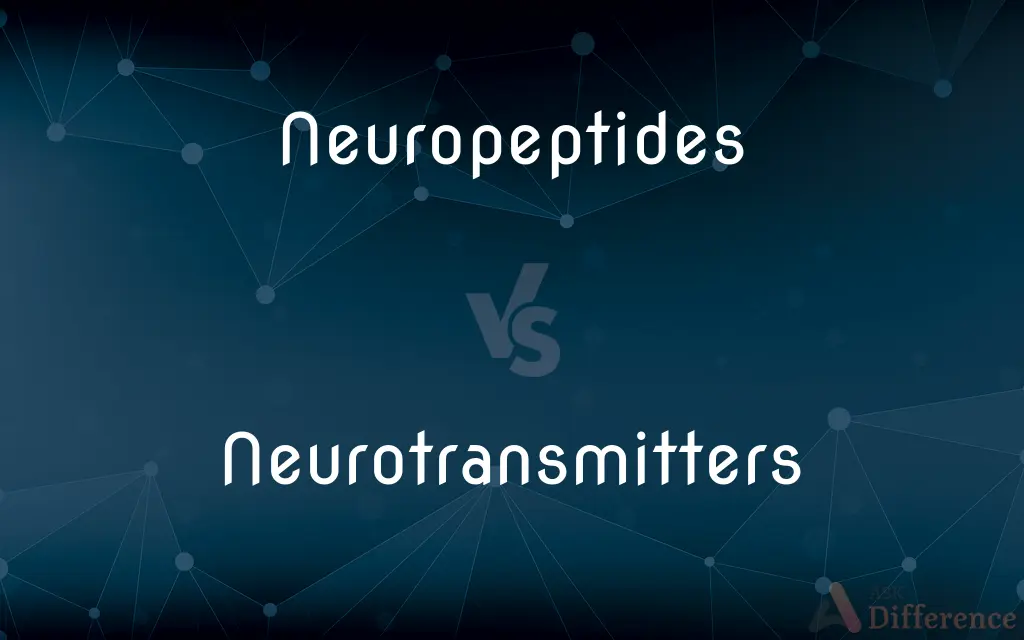Neuropeptides vs. Neurotransmitters — What's the Difference?
By Tayyaba Rehman — Published on November 29, 2023
Neuropeptides are short chains of amino acids acting as signaling molecules in the nervous system. Neurotransmitters are chemical messengers that transmit signals across a synapse from one neuron to another.

Difference Between Neuropeptides and Neurotransmitters
Table of Contents
ADVERTISEMENT
Key Differences
Neuropeptides are unique molecules in the nervous system, composed of short chains of amino acids. These peptides function primarily as signaling molecules. Their production, unlike Neurotransmitters, occurs inside the cell body of neurons. Once synthesized, Neuropeptides are transported to axonal endings, where they play roles in modulating neuronal communication and behavior, influencing various physiological processes.
Neurotransmitters, on the other hand, are chemical messengers that facilitate the transmission of signals from one neuron to the next across synapses. They are crucial in determining how the nervous system responds to external stimuli. Released from synaptic vesicles in axon endings into the synaptic cleft, Neurotransmitters bind to receptors on the post-synaptic neuron, leading to changes in its electrical state and impacting signal transmission.
While Neuropeptides and Neurotransmitters both play essential roles in neuronal communication, their modes of action differ. Neuropeptides often act in a modulatory capacity, enhancing or diminishing the effects of neurotransmitters. They can also function over longer durations and distances, affecting areas beyond their release sites. Neurotransmitters typically have rapid, direct effects on their target cells and get quickly degraded or reabsorbed, ensuring the short-lived nature of their action.
Another distinguishing feature is their synthesis location. Neuropeptides are made in the cell body and require transport to axon terminals. Neurotransmitters, in contrast, are often synthesized close to their release sites. The diversity of Neuropeptides also exceeds that of Neurotransmitters, implying a broader range of physiological roles and functions.
Conclusively, Neuropeptides and Neurotransmitters are both vital for the proper functioning of the nervous system, playing distinct yet sometimes overlapping roles. While both are involved in transmitting information, their synthesis, mode of action, and influence on the nervous system set them apart.
ADVERTISEMENT
Comparison Chart
Composition
Short chains of amino acids.
Specific molecules or chemical compounds.
Function
Modulate neuronal communication.
Transmit signals across synapses.
Duration of Action
Can function over longer durations.
Rapid, short-lived effects.
Synthesis Location
Inside the cell body of neurons.
Often near release sites.
Diversity
Greater variety, implying broader physiological roles.
Lesser variety compared to Neuropeptides.
Compare with Definitions
Neuropeptides
Molecules acting as signaling entities in neurons.
Certain Neuropeptides modulate pain perception.
Neurotransmitters
Transmit signals across synapses from one neuron to another.
Dopamine is a neurotransmitter associated with pleasure and reward.
Neuropeptides
Produced inside the cell body of neurons.
The production of Neuropeptides involves a complex synthesis process.
Neurotransmitters
Released from synaptic vesicles into the synaptic cleft.
The release of neurotransmitters is an essential step in signal propagation.
Neuropeptides
Short chains of amino acids in the nervous system.
Neuropeptides influence various physiological processes.
Neurotransmitters
Bind to receptors on the post-synaptic neuron.
Certain drugs can block neurotransmitter receptor binding.
Neuropeptides
Impact behavior and various physiological functions.
Neuropeptides are crucial for regulating appetite and mood.
Neurotransmitters
Chemical messengers in the nervous system.
Neurotransmitters facilitate communication between neurons.
Neuropeptides
Play roles in modulating neuronal communication.
Neuropeptides can enhance or diminish neurotransmitter effects.
Neurotransmitters
Determine neural response to external stimuli.
An imbalance of neurotransmitters can lead to mental health issues.
Neuropeptides
Any of various short-chain peptides found in brain tissue, such as endorphins.
Neurotransmitters
A chemical substance, such as acetylcholine or dopamine, that transmits nerve impulses across a synapse.
Neuropeptides
Plural of neuropeptide
Neurotransmitters
Plural of neurotransmitter
Common Curiosities
How fast do Neurotransmitters act?
Neurotransmitters typically have rapid, short-lived effects on their target cells.
Where are Neuropeptides synthesized?
Neuropeptides are produced inside the cell body of neurons.
What are Neuropeptides?
Neuropeptides are short chains of amino acids acting as signaling molecules in the nervous system.
What happens to Neurotransmitters after their release?
They bind to receptors or are degraded or reabsorbed.
Which has a more prolonged action, Neuropeptides or Neurotransmitters?
Neuropeptides can act over longer durations compared to the rapid action of Neurotransmitters.
How do Neurotransmitters function?
Neurotransmitters are chemical messengers that transmit signals across a synapse from one neuron to another.
How do Neuropeptides influence behavior?
Neuropeptides can regulate aspects like mood, appetite, and pain perception.
Do Neuropeptides and Neurotransmitters overlap in function?
They both play roles in neuronal communication, but their specific functions and modes of action can differ.
Are there more types of Neuropeptides or Neurotransmitters?
The diversity of Neuropeptides exceeds that of Neurotransmitters.
Where are Neurotransmitters stored before release?
Neurotransmitters are stored in synaptic vesicles in axon endings.
Do Neuropeptides have a direct or modulatory role?
Neuropeptides often act in a modulatory capacity, affecting the influence of neurotransmitters.
Can an imbalance of these chemicals impact health?
Yes, imbalances in Neuropeptides or Neurotransmitters can lead to various health issues, including mental disorders.
Do drugs affect Neuropeptides and Neurotransmitters?
Yes, certain drugs can impact the production, release, or function of both.
Are both involved in pain perception?
Yes, both Neuropeptides and Neurotransmitters play roles in modulating pain perception.
Which neurotransmitter is linked to pleasure and reward?
Dopamine is a neurotransmitter associated with pleasure and reward.
Share Your Discovery

Previous Comparison
Smooth Muscle vs. Skeletal Muscle
Next Comparison
Open Heart Surgery vs. Closed Heart SurgeryAuthor Spotlight
Written by
Tayyaba RehmanTayyaba Rehman is a distinguished writer, currently serving as a primary contributor to askdifference.com. As a researcher in semantics and etymology, Tayyaba's passion for the complexity of languages and their distinctions has found a perfect home on the platform. Tayyaba delves into the intricacies of language, distinguishing between commonly confused words and phrases, thereby providing clarity for readers worldwide.
















































